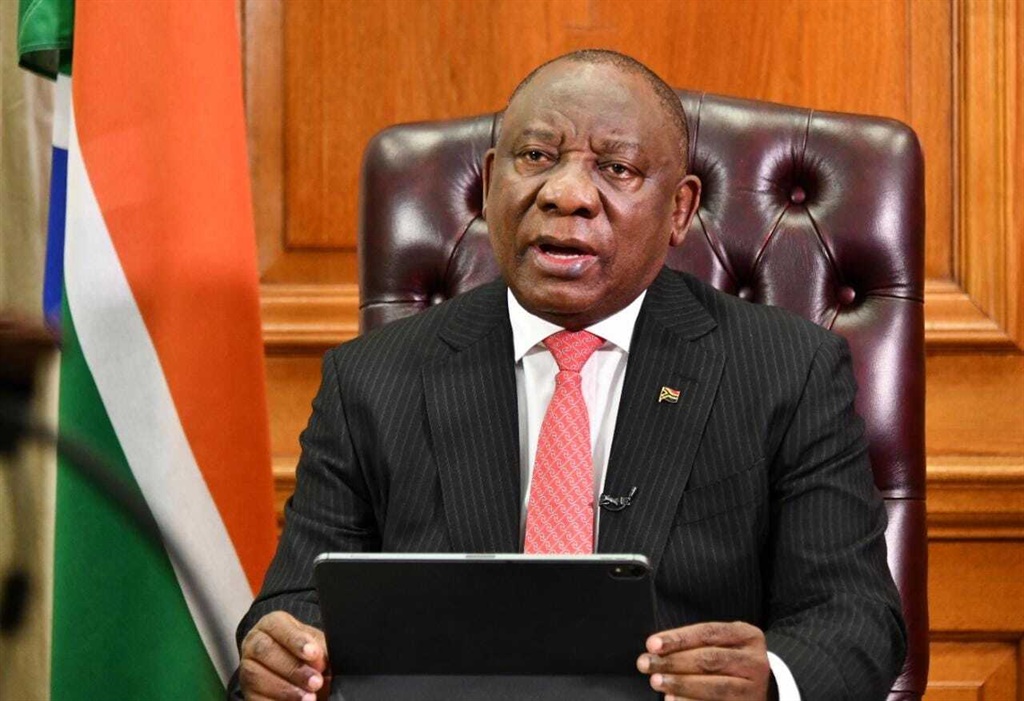


President Cyril Ramaphosa addresses the nation.
President Cyril Ramaphosa opted to listen to the unions and career politicians rather than experts and scientists when he made the decision to close the country‘s public schools. He has yet again missed an opportunity to lead, writes Pieter du Toit.
President Cyril Ramaphosa, ignoring volumes of evidence about why schools can and must remain open, on Thursday night buckled to pressure from teachers’ unions and announced the public schools system will be shut down for four weeks.
Somberly addressing the country in his umpteenth televised address, he meekly capitulated to teachers’ unions which have over the years used children’s education and the schooling system as a bargaining chip in the all-consuming game that politics and the attainment of political power has become in this country.
Ramaphosa spoke unconvincingly of the need to put the health, social and educational needs of children first, before listing the advisory by the World Health Organisation (WHO) – that schools should be reopened in areas where there is low community transmission – as the main reason for his collective’s decision.
And as has become the wont of Ramaphosa and his government, he announced the decision – which will have far-reaching consequences for millions of families, children’s academic development and the economy – without providing anything remotely approaching a coherent argument.
South Africans now understand – as they were forced to learn with previous unmotivated and unsupported regulations, decrees and announcements – it will be near impossible to get to the bottom of why whatever ministerial council or body or grouping took the decision they did.
That is because this government remains averse to any form of accountability.
The president never answers questions from the media, and there is no prospect of him doing so soon. The relevant ministers will also bob and weave from behind the cloak of invisibility created by a phalanx of spokespersons, while the scientists and experts – the people who produce research based on empirical evidence – will be sidelined or threatened.
Ramaphosa is afraid to lead.
In all the criticism levelled against him in recent weeks, no one has ever said there are easy decisions. In fact, given the poor state of the state, there are only decisions with bad and worse outcomes. But that is the job. Without visible and strong leadership as well as transparent and clear decision-making processes, South Africa will keep on muddling through.
EDITORIAL | Ramaphosa cannot be the referee between divergent views, leading means making unpopular decisions
In his address, Rampahosa attempted to garner sympathy by saying more than 60 stakeholder organisations were consulted but it was “difficult to find consensus on the right approach”.
But there will never be any consensus when you are governing a country like South Africa – in fact any country, unless it is a dictatorship or a city state. There will always be contestation and vested interests. It is the job of a leader to cut through the noise and use evidence-based decision-making to lead and make the tough calls.
In this case, the scientific evidence to keep schools open was overwhelming. The politics, however, spoke louder.
Angie Motshekga, the minister of basic education, wanted schools to remain open and functional. She was supported by a range of experts and academics, from both education and medicine, who argued the rate of transmission among children, and from children to adults, does not justify a wholesale closure of schools.
But the concerns of unions, notably the South African Democratic Teachers’ Union and the National Professional Teachers’ Association of South Africa, that their members were being exposed to the coronavirus while teaching, weighed heavier. And why? Because the unions can exact a political price from an errant president, and for a governing party obsessed with remaining in power come hell or high water, the prospect of a union going rogue is too much too bear.
Ramaphosa, however, did not explain the arguments for and against, neither did he refer to the body of research supporting or dismissing either argument. This government, like it has done with so many other decisions, does not want to engage with evidence in a dispassionate and scientific way.
On Thursday night, the word from some members of the Ministerial Advisory Committee on Covid-19 was there was vehement disagreement with the president’s announcement. But experts, academics and scientists can be humoured and then ignored.
Just like schoolchildren.
PS: The economy is being ravaged, the tourism industry is collapsing and the hospitality industry imploding. Nationwide protests took place yesterday to try and bring the government to other insights. Ramaphosa did not once mention it. He did, however, say the government will continue to protect lives and livelihoods.

